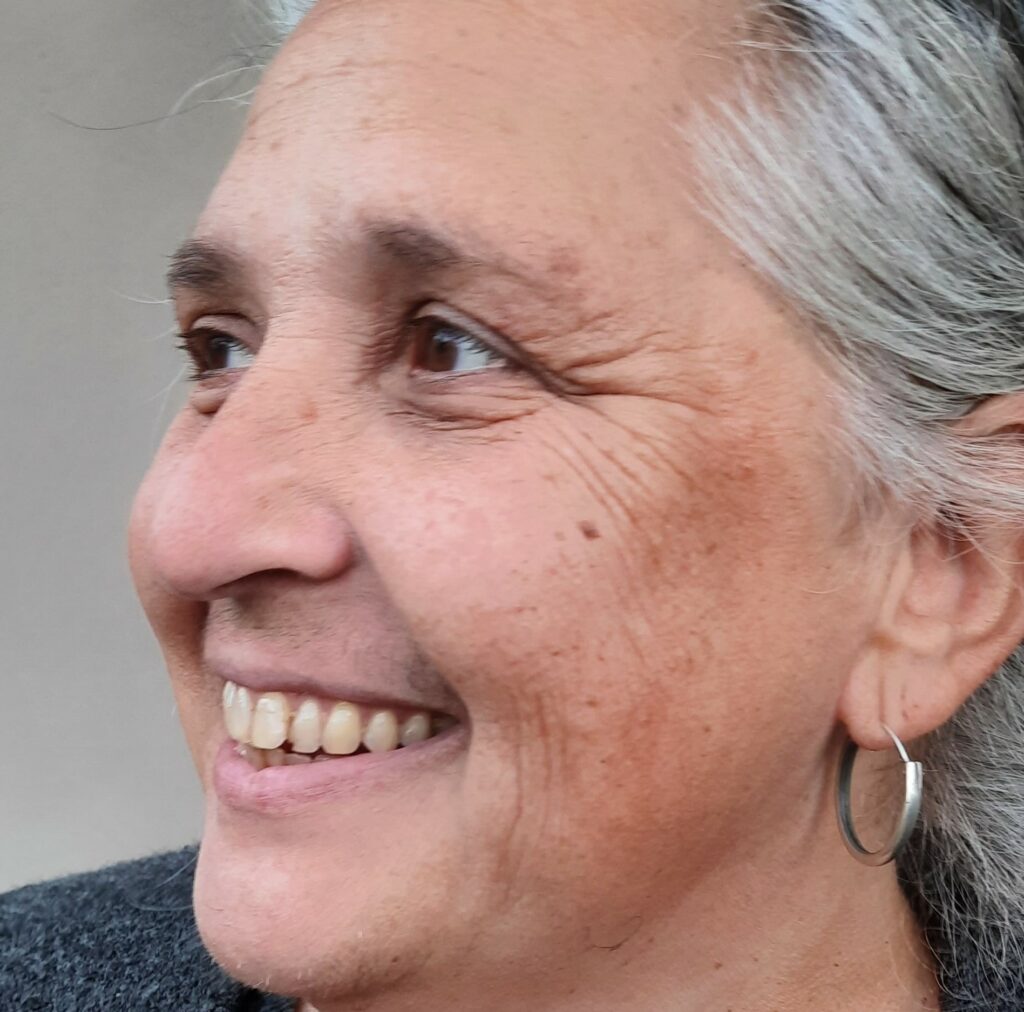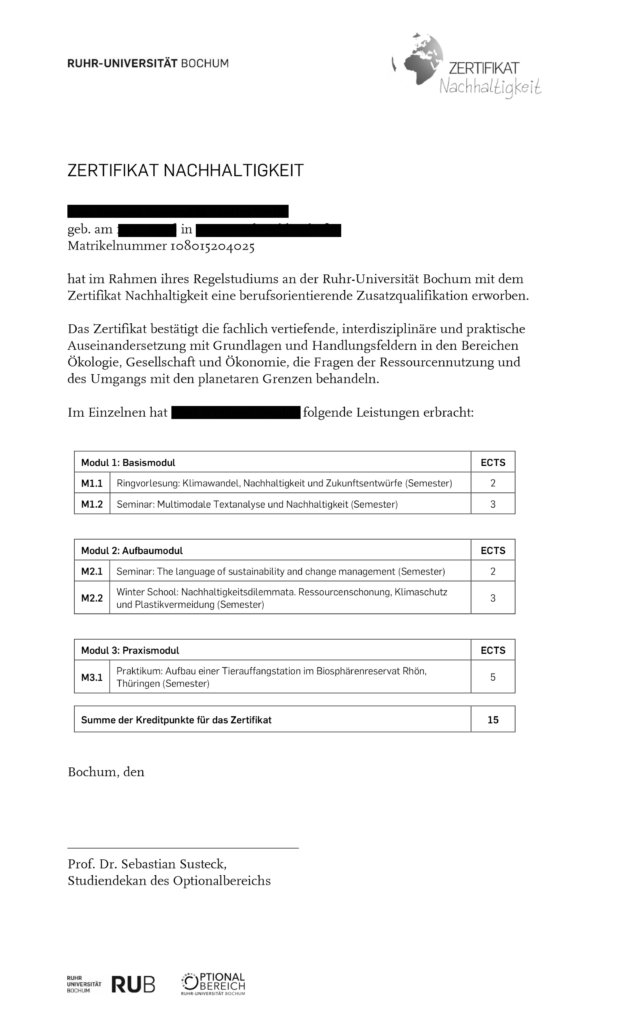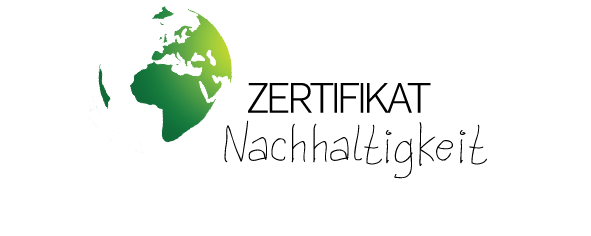looking for …
a future-oriented additional qualification for your degree, for more interdisciplinarity, profiling and practical relevance?
Sustainability is the future topic of our time. Economy and society are looking for people who can shape challenging ecological transformation processes with creativity and competence.
With the certificate, you will gain transdisciplinary insights, key competencies and a scientifically reflected attitude towards selected fields of action of sustainable development already during your studies.

The quick overview
Basic module
5 ECTS
Introduction to the scientific and socio-political foundations (interdisciplinary lecture series with supplementary seminar or project work).
Advanced module
5 ECTS
Room for in-depth study from different subject perspectives (optional area, free elective Master or recognition of subject offerings).
Practice module
5 ECTS
Space for application and skills training (Optionalbereich, free elective Master’s program or recognition of specialized internships).
The people behind
Think tank, task force, mission statement – the Ruhr-Universität Bochum is on the way to more sustainability in all areas of campus life. The certificate is an important step towards making the topic of sustainability visible and anchoring it in the teaching of all faculties. To ensure that the plan succeeds, an interfaculty project group is working on its implementation.
Team Members
Henning Feldmann (Professional School of Education), Martina Flörke (Civil and Environmental Engineering), Birgit Frey (Optionalbereich), Dorothee Meer (Philology), Stephanie Heimgartner (Philology), Skadi Heinzelmann (Biology), Wilhelm Hofmann (Psychology), Ute Lange (Educational Science), Astrid Seckelmann (Geography), Fabian Schäfer (Management and Economics)
Organizationally, the certificate is currently supervised by the Optionalbereich of the RUB.
Coordination Office

Birgit Frey
GAFO 04 / 914
(+49) 234 / 32 – 29223
zertifikat-n (at) rub.de
How it works
the program
Structure
The certificate comprises three modules of 5 ECTS each, i.e. a total of 15 ECTS. In order to make it possible for all RUB students to acquire the certificate within the standard period of study, we have designed it to be largely flexible. The modules are integrated in the Optionalbereich or should be able to be integrated in the elective and supplementary areas of the degree programs. In addition, students can have suitable specialized courses or modules credited to the certificate. The certificate can also be “stretched” from the Bachelor’s to the Master’s program, provided that the studies are continued at the RUB. The basic module alone is the compulsory module for all students to acquire the certificate. It cannot be substituted by the recognition of comparable or already completed study achievements and should [recommendation!] be completed before the advanced or practical module, if possible.
Access
For Bachelor students (B.A. and B.Sc.)
Two-subject Bachelor students with Optionalbereich complete the certificate in its entirety as part of their profile studies.
Two-subject Bachelor’s students with the professional goal of becoming a teacher use the free elective module according to their own interests in order to complete the basic module. The advanced module can be completed through the recognition of specialized courses, the practical module, among other things, within the framework of the professional field internship. It is also important here that these offerings fulfill a clear sustainability reference in the sense of the certificate (see rules for the recognition of academic credits).
Single-subject Bachelor students with Optionalbereich (Archaeology, Biology, Social and Sport Science) complete the basic module as part of their Optionalbereich studies. The advanced module and the practical module can be completed, depending on the program requirements, through the recognition of specialized courses and internships with a clear connection to sustainability (see rules for the recognition of academic credits) or with the designated certificate offerings in the Optionalbereich (available through the module search of the Optionalbereich).
Single-subject Bachelor’s students without Optionalbereich (all other programs) complete the basic module as part of their program-specific elective or supplementary area. The advanced module and practical module can be completed via the recognition of specialized courses and internships with a clear reference to sustainability (see rules for the recognition of academic credits).
The basic module as well as offers for the advanced module are available via the module search of the Optionalbereich. In addition, it is possible to complete the advanced module and the practical module as a voluntary 10-ETCS internship, provided that the internship fulfills a clear sustainability reference in the sense of the certificate (see rules for the recognition of study achievements).
For Master students (M.A. and M.Sc., state examination)
Single-subject Master’s students can use the available ECTS of their program-specific elective or supplementary areas for the acquisition of certificates (available promptly via the free elective Master’s area) or have supplementary specialized courses and internships with a clear sustainability reference (see rules for the recognition of study achievements) recognized.
Two-subject master’s students and students in the Master of Education must complete the certificate largely through the recognition of course work from the subject due to the lack of interdisciplinary elective options. The basic module must therefore be completed in addition to the regular course of study.
The basic module as well as a selection of interdisciplinary module offerings for the advanced module are available for Master students via the special course catalog (SVVZ) free elecitve Master’s area. Please check the respective course and module descriptions to see if the offering is designated for the Certificate in Sustainability.
Rules for the recognition of academic credits
For the certificate (advanced and practical module), study achievements from the subject can be recognized if they fulfill a clear sustainability reference in the sense of the certificate:
The term sustainability covers topics from the fields of ecology, society and economy that deal with issues of resource use and the management of planetary boundaries. This also includes those topics that, based on such an understanding of sustainability, relate to further United Nations Sustainable Development Goals or SDGs.
In each faculty there are module coordinators for the certificate, who check and confirm the requirements for the recognition of specialized courses for the certificate.
List of module coordinators in the faculties
| Faculty of Protestant Theology | Prof. Dr. Christina Eichel, Dean of Students |
| Catholic Faculty | Prof. Dr. Katharina Klöcker, Dean of Students |
| Institute of Philosophy | Prof. Dr. Michael Anacker, Dean of Students |
| Institute for Educational Science | Dr. Ute Lange, Dean of Students |
| Faculty of Historical Sciences | N.N. |
| Faculty of Philology | Dr. Stephanie Heimgartner, Deanery |
| Faculty of East Asian Studies | Prof. Dr. Rüdiger Breuer, Dean of Students |
| Faculty of Sport Sciences | N.N. |
| Faculty of Psychology | Prof. Dr. Wilhelm Hofmann, Judith Mischnat, Student Advisor |
| Faculty of Law | N.N. |
| Faculty of Economics | N.N. |
| Faculty of Social Science | Dr. Jan Schedler, Dean of Students |
| Faculty of Civil and Environmental Engineering | Anette Hafner, Audit Committee Rita Pape, Head of the examination office |
| Faculty of Mechanical Engineering | Dr. Ute Berbuir |
| Faculty of Electrical Engineering and Information Technology | N.N. |
| Faculty of Computer Science | N.N. |
| Faculty of Mathematics | N.N. |
| Faculty of Physics and Astronomy | Susanne Häffner, Examination Office |
| Faculty of Earth Sciences | N.N. |
| Faculty of Chemistry and Biochemistry | N.N. |
| Faculty of Biology and Biotechnology | Skadi Heinzelmann, Student Advisor |
| Faculty of Medicine | Prof. Dr. Thorsten Schäfer, Dean of Students |
If your contact is not yet included, please contact the coordination office first if you have questions about recognition.
Your way to the certificate

1.
The optimal entry into the certificate succeeds with the basic module. Depending on access, registration takes place via the corresponding module in the Optionalbereich or free elective Master’s area.
2.
Offers for advanced and practical modules are available in the Optionalbereich or free elective Master’s area, depending on access. Alternatively, suitable offers from the subject can be recognized.
3.
The recognition of credits from the subject is done by the module coordinators of your faculty (informally by e-mail). This is not necessary if you cover all achievements for the certificate via the Optionalbereich or free elective Master’s area.
4.
To have the certificate issued, forward the confirmation of recognitions with a current printout of your transcript to the coordination office. The certificate can now be issued and collected promptly.
current and last semester
Courses
Current offers in winter term 2023/24
In addition to selected specialized courses that are only open to students in their respective degree program, the Sustainability Certificate includes a wide range of interdisciplinary courses and modules from a wide variety of disciplines that you can take as part of your elective and supplementary areas after consulting your academic advisor.
For information on the registration procedure, please refer to the respective descriptions in the general course catalog (VVZ/Campus). If the registration deadline has expired, please contact the respective lecturer by e-mail to see if there are still places available. However, it is essential to contact your departmental advisor before registering to find out whether and how the desired course can be credited to the elective or supplementary area of your degree program.
For Bachelor students
Basic Module Certificate Sustainability
Nachhaltigkeit und Zukunft – Interdisziplinäre Aspekte
Advanced Module Certificate Sustainability
Winter School Nachhaltigkeitsdilemmata: Ressourcenschonung, Klimaschutz und Plastikvermeidung
Wasser im Wandel – Eine postindustrielle Gewässergeschichte des Ruhrgebiets
Renewable Energy Systems
Practice Module Certificate Sustainability
KIbox: Lösung von Nachhaltigkeits-Challenges durch den Einsatz künstlicher Intelligenz
Scholars under political discrimination and persecution. Scholars at Risk Human Rights Advocacy Seminar
Winter School Nachhaltigkeitsdilemmata: Ressourcenschonung, Klimaschutz und Plastikvermeidung
Berufsfeldpraktikum Let’s play Schule
For Master students
Basic Module Certificate Sustainability
Basismodul Zertifikat Nachhaltigkeit
Advanced Module Certificate Sustainability
Winter School Nachhaltigkeitsdilemmata: Ressourcenschonung, Klimaschutz und Plastikvermeidung
Die Außenpolitik der EU und China´s im Energie- und Sicherheitsbereich
Digitalität und Nachhaltigkeit am Beispiel von “Fridays for Future”
Angewandte Sozialpsychologie: Die drei Säulen der Nachhaltigkeit
Psychologie der Nachhaltigkeit – Forschungskolloquium
Practice Module Certificate Sustainability
Pitch your Science
Winter School Nachhaltigkeitsdilemmata: Ressourcenschonung, Klimaschutz und Plastikvermeidung
THE INITION
The lecture series
CLIMATE CHANGE, SUSTAINABILITY AND FUTURE DESIGNS
The lecture series “Climate Change and Sustainability” is the centerpiece of the basic module of the RUB Sustainability Certificate. Each semester, current topics of a sustainable human-environment relationship are examined from a multidisciplinary perspective, thus preparing the basis for a productive cross-disciplinary discourse. The focus is on the use of our living space as well as the potentials of its sustainable transformation.
The lecture series starts on October, 19 and takes place every Thursday from 4 to 6 pm at HGB 50. It is also open to the interested public; registration informally by email to Mrs. Vogler (ecampus-optionalbereich@rub.de).
Topics and dates in winter term 2023/24
Introductionary sessions
October 19, 2023
Introduction to basic terms and concepts
Prof. Dr. Dorothee Meer (German Studies)
October 26, 2023
The great transformation: climate protection as a social challenge
Prof. Dr. Wilhelm Hofmann (Psychologie)
November 2, 2023
World in Transition: Biodiversity Loss and Climate Change
Prof. Dr. Ralph Tollrian (Biologie)
Thematic block I: Waste Management and the Appropriation of Landscape
November 9, 2023
Participatory approaches as a possible solution for sustainable waste management in Jakarta? Insights into potentials, challenges and limitations
Abeer Abdulnabi Ali, M. Sc. (Geography)
November 16, 2023
E-waste and recycling: cycles and industrial responsibility
Dr. Stefan Laser (Sociologie)
November 23, 2023
Beyond Sweet Fruits. On the appropriation of landscape and migrant labor in recent strawberry cultivation in Greece
Johannes Jungfleisch, M.A. (Archaeologie)
Thematic block II: Water as a (scarce) resource
November 30, 2023
Strategies for sustainable use of water resources
Dr. Birgit Elvers (Geography)
December 7, 2023
After the Romanticism of the Rhine. River Literature in the Anthropocene
PD Dr. Tanja van Hoorn (German Studies)
December 14, 2023
Water resources and competition of use
Prof. Dr.-Ing. Martina Flörke (Civil and environmental engineering)
Thematic block III: Circular economy processes and strategies
January 11, 2024
Sustainable Processes in the Circular Economy: Tasks, Approaches and Areas of Conflict
Dr.-Ing. Philip Biessey (Mechanical Engineering)
January 18, 2024
Circular value creation using the example of high-alloy metallic materials – challenges and solutions
Prof. Dr. Sebastian Weber (Mechanical Engineering)
January 25, 2024
Economic approaches to promote circular economy
Prof. Dr. Michael Roos (Economics)
Closing session
February 1, 2024
Finding an (interdisciplinary) conclusion by developing perspectives
Prof. Dr. Dorothee Meer (German Studies)
Information for RUB Students
Registration for students of the Optionalbereich (two-subject as well as one-subject Bachelor Social Science, Sport, Biology and Archaeology) is done via the module “Nafhhaltigkeit und Zukunft – interdisziplinäre Aspekte” via one of the second parts. For other one-subject bachelor and master students, registration takes place via the module “Basic Module Certificate Sustainability”.
The lecture series in summer term 2023
April 13, 2023
Human image and communication in the climate crisis: what motivates and inspires people
Verena Kantrowitsch, Psychologists for Future
April 20, 2023
Urban Greening – Potentials of urban green infrastructure from a natural science perspective
Dr. André Baumeister, Ruhr-University Bochum
April 27, 2023
Energy transition: The value of the past for sustainable regional development
Dr. Corinne Geering, Leibniz-Institute for History and Culture of Eastern Europe, Leipzig
Torsten Meyer, German Mining Museum, Bochum
May 04, 2023
Urban Utopia – a human geographical perspective
Prof. Dr. Veronica Cummings, Johannes Gutenberg-University Mainz
May 11, 2023
Climate protection through peatland conservation
Susanne Abel, University of Greifswald / Greifswald Moor Centrum
May 25, 2023
Water scarcity in climate change as a challenge for democracy – a political science perspective
Dr. Cornelia Frings, Johannes Gutenberg-University Mainz
June 15, 2023
With the MOSAiC ice floe to the North Pole: Insights into the largest Arctic expedition of our time
Dr. Stefanie Arndt, Alfred-Wegener-Institute
June 22, 2023
Water, a valuable resource: sustainable management in times of climate change
Prof. Dr. Claudia Pahl-Wostl, Institute for Environmental Systems Research, University of Osnabrück
June 29, 2023
Shaping food systems: How we can turn things around together
Prof. Dr. Melanie Speck, University of Applied Sciences Osnabrück
July 06, 2023
Carbon Capture and Storage
Prof. Dr.-Ing. Roland Span, Ruhr-University Bochum

Questions still open?
Frequently asked questions
Who can acquire the Sustainability Certificate?
The certificate can be acquired by all regularly enrolled RUB students (Bachelor, Master, PhD). There are no admission requirements.
What distinguishes bachelor’s students with from bachelor’s students without an Optionalbereich?
For bachelor students with Optionalbereich, this is an integral elective of their curriculum. These are students in the two-subject bachelor as well as students in the single-subject bachelor programs Archaeology, Biology, Social Science and Sports Science.
For Bachelor students without an Optionalbereich, this is not a compulsory part of their studies. They cannot take the courses offered in the Optionalbereich.
How is the sustainability certificate structured?
The certificate comprises three modules of 5 ECTS each. It can be completed with designated modules from the Optionalbereich and the free elective Master’s area as well as via the recognition of (already completed) study guides from the subject.
Where can I find the basic module?
Bachelor students can find the basic module “Sustainability and Future – Interdisciplinary Aspects” on a semester-by-semester basis via the module search of the Optionalbereich by activating the filter “Certificate Sustainability” on the left side. Master students can find the “Basic Module Certificate Sustainability” in the special course catalog (SVVZ) of the free elective Master’s area.
Where can I find the modules and events for the advanced and/or practical module?
Bachelor students can find the offers for the certificate via the module search of the Optionalbereich. By activating the filter “Certificate Sustainability” on the left side, all current semester offers for the certificate can be retrieved. The description shows the assignment of the offers to the advanced and/or practical module.
Master students can find interdisciplinary offers for the certificate via the special course catalog (SVVZ) free elective Master’s area. In the description the allocation of the offers to the advanced and/or practical module is shown.
Are there any restrictions on participation in the offerings?
The courses designated for the certificate in the Optionalbereich and in the free elective Master’s can be taken depending on the available places.
Can achievements (already made) from the subject be recognized?
Yes, provided that the courses are related to sustainability in the sense of the certificate. The content check and confirmation is carried out by the module coordinator of your faculty. A list of contact persons will be available soon.
If you do not find your question or one similar to it in this collection, feel free to send us an email.